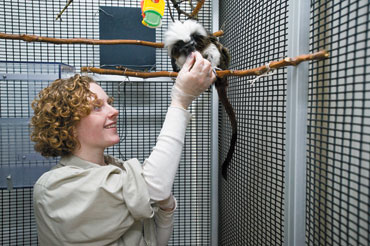The Wisconsin Experience: Psychology gets undergraduate research down to science
Choices, choices. In every undergraduate major, a time comes around a student’s junior year to explore different academic specialties within a degree program, moving up the pyramid from general education to refined focus.

Undergraduate psychology student Emily Spray Rothwell works with cotton-top tamarins as part of a research project with psychology Professor Charles Snowdon. Rothwell is researching behavior patterns of monkey couples related to partnership. The Department of Psychology has embraced undergraduate research by making it part of its curriculum.
Photo: Bryce Richter
But in the Department of Psychology, those choices aren’t limited to the classroom. A significant majority of the department’s undergraduate majors choose not only an academic specialty, but also an in-depth experience in a psychology research lab.
The numbers tell the story: At this point this semester, psychology has 324 students working in its laboratory environments. And in the past decade, 5,823 students have enrolled in a research-based independent study program within the department — an average of 215 per semester.
As the university recognizes the 10th anniversary of the Undergraduate Symposium, which reflects the best work of hundreds of students campuswide, it’s valuable to reflect on the psychology department’s long-term achievement of bringing undergraduate research from a potent supplement to a mainstream credential among its 300-plus graduates each year.
“I think for many of us, the training of future scientists is one of the greatest privileges we have,” says Joe Newman, psychology department chair and a national leader in studying criminal offenders who suffer from psychopathic disorders. “We all take pride in that, when we can publish papers with undergraduates, or we see some of our former students go on to take top positions in their field.”
Psychology Professor Charles Snowdon, a longtime champion of undergraduate research, says the practice is mutually beneficial to both student and professor. Snowdon was recognized in 2007 for his dedication to mentoring by the American Society of Primatologists, which organized a mentorship symposium in his name that featured many of his past students.
“Undergraduates are often more uninhibited in their ideas than graduate students, so I find them, frankly, a source of innovative ideas,” Snowdon says. “I can think of several instances where I changed the direction of my research as the result of an interaction with an undergraduate. It’s been a career stimulus … That is an incredible payoff for a scientist.”
The discipline of psychology lends itself well to undergraduate participation, Newman says, given the work encompasses a strong mix of cognitive and affective neuroscience, social psychology, and the study of attitudes and perceptions. But UW–Madison psychology is also the No. 1 psychology department in the nation in landing federal research money, by a large margin, which Newman says translates to a smorgasbord of cutting-edge opportunities for students.
Newman ticks off some of the more popular choices for undergraduates: They can work in a lab that explores the mysteries of how infants learn language; research how sexual harassment during adolescence creates vulnerabilities later to eating disorders and depression; work on the nature of addictions, and how nicotine and alcohol affect the brain; study the origins and persistence of stereotypes and prejudice; research how child abuse and neglect can alter the thinking process; or study the phenomenon of intrinsic motivation.
For psychology senior Emily Rothwell, the attraction early on was a fascination with the origins of human behavior. Her brother is a UW–Madison psychology graduate and shared similar interests, so she came to UW–Madison with a familiarity of the terrain.
Her interests led her to Snowdon’s lab, which studies cotton-top tamarins, a remarkable population of squirrel-sized monkeys that practice cooperative breeding and other highly social behaviors. During her sophomore summer, Rothwell landed an apprenticeship grant from the honors program to get fully immersed in a research project with the tamarins.
Her research was furthered again by a study-abroad experience in Ecuador, where she had the chance to do field work with primates. Finally, Rothwell launched her own independent undergraduate thesis studying the role of relationship quality in buffering monkeys when faced with novel situations. She is in the process of writing her thesis this semester.
“I feel like it hasn’t been dumb luck for me to end up where I’ve wanted to be,” Rothwell says. “The psychology department has created all these steps that ultimately led me here. Everything was put in place.”
Indeed, the fusion of research into the undergraduate experience has become a multilayered process for the department. Melanie Jones, an undergraduate adviser for the department, says it begins with an introductory-level course that invites guest faculty researchers to spend a class period describing their research and showing how students can get involved. The department holds research fairs to further expose students to opportunities, and early advising in the department focuses on creating natural matches between student interests and lab work. It encouraged students to apply for summer research stipends to give them a true feel for the lab life.
By the time students are in their majors, they will choose a path to completing a required “level three” of their degree, where they need to demonstrate more in-depth topical knowledge, participate in small groups, and be reading, analyzing and producing written projects on their chosen topics. Jones says about a third of students sign a formal contract with a faculty mentor and make a commitment to a full year of laboratory work that will meet part of the level-three requirement.
“Some of the work these students start doing in the labs is not so glamorous,” Jones says. “But at the same time they are gaining substantive knowledge by reading research from that area and reporting back. Talking about what you’ve learned in a group and debating experiences, those are all part of the experience.”
While undergraduate research will make some students more graduate school-ready, it is by no means a pursuit limited to those pursuing graduate school, says psychology undergraduate adviser Stephanie Osborn.
“Most of our students don’t go on to graduate school, and research experience is also serving them well,” Osborn says. “Students who go on to work outside of psychology, in human development or family studies, believe their research is absolutely useful to their field.”
Osborn says the department routinely has examples of undergraduates who receive co-authorships on published papers and get to co-present at national conferences. The research experience also helps the department’s large number of double-majors, who frequently pursue fields such as criminal justice and biology in parallel with psychology.
And a completed research project is certainly a cherry on an undergraduate resume. Osborn says that 60 psychology students have presented their work at the Undergraduate Symposium in the past nine years. And over the past decade of the Hilldale Undergraduate Research programs, about 15 percent of those $5,000 individual awards have gone to psychology students.
For Rothwell’s part, the lab work was an eye-opening experience. She presumed she wouldn’t enjoy either lab or field research and was pleasantly surprised on both fronts. “I’m really, really passionate about it now that I know what it’s all about.”
She has even found a way to convince her grandparents of the value of her up-close work with the tamarin colony. They seemed a bit skeptical during a recent winter break visit.
“I explained that I got to use creativity, think outside the box, not accept what anyone tells me or what’s previously been written, and believe in my own observations. I can get published in a journal and evaluate what other people have done.
“ Now the only meaningful way that I can obtain information is through this process,” Rothwell says. “I have a lot of faith in this process.”
Tags: learning, psychology, research



